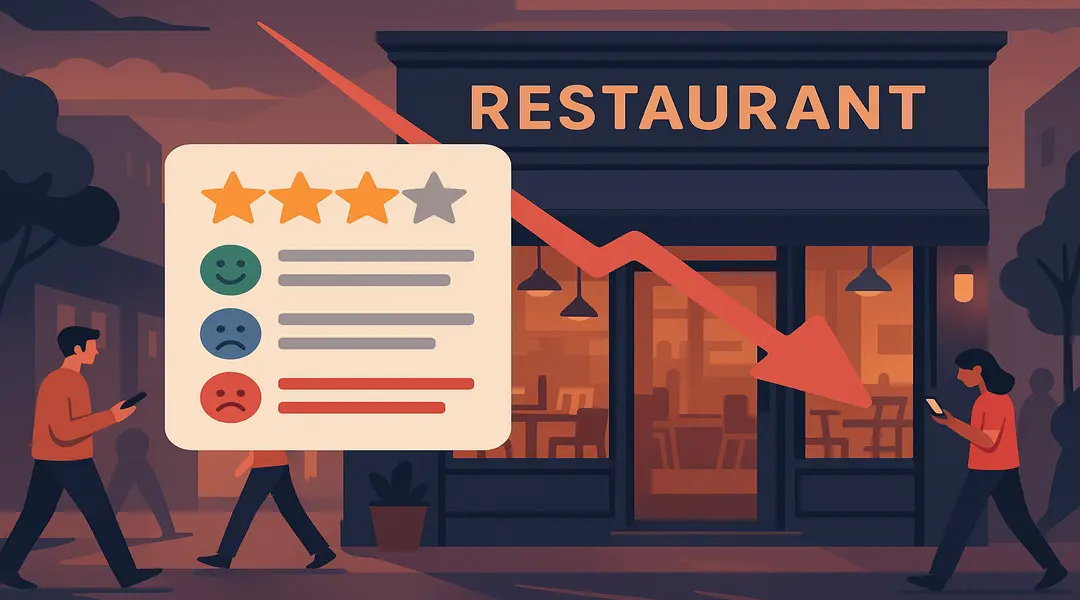When you work with restaurants long enough, you start noticing the same pattern. A place can have great food, a friendly team, regular customers who swear by it, and still fall behind online simply because its reputation on the internet doesn’t match what happens in real life. It surprises a lot of owners, but diners usually make decisions long before they even pull into the parking lot. They check their phones first, and whatever shows up there becomes the truth they believe.
Table of Contents
All it takes is a mix of little things. A few reviews that nobody answered. Hours that look different depending on where you find them. Menus with prices that no longer match what the restaurant charges. A profile photo that was taken years ago. Maybe five or ten reviews scattered across the entire year. Nothing dramatic on its own, but together those small issues start working against the restaurant. Meanwhile, their competitors are posting updates, staying active, answering customers quickly, and keeping their information tidy. It adds up.
Most restaurants don’t realize how much of this is avoidable. And the problems almost always start in the same places.
Ignoring Negative Reviews Tanks Trust Fast
Owners don’t always realize how much damage an unanswered bad review can cause, but diners pick up on it immediately. People pay close attention to how a restaurant reacts when someone has a complaint, and silence almost always sends the wrong message. It makes the business seem disconnected or uninterested. Agencies run into this constantly, and the ripple effect is usually much larger than owners expect when building SEO strategies for restaurants.
Take just one negative comment that sits there without a response. It might look harmless at first, but it can sway dozens of potential customers without anyone noticing. Some studies even estimate that one ignored review can drive away up to thirty diners. This hits harder now because negative restaurant reviews have been increasing, while positive ones are appearing less frequently. The tide has shifted, and customers have become far quicker to judge based on what they see online.
Part of the challenge is how people voice frustration today. If service is slow, a meal is missing, or prices have jumped, most diners don’t wait to talk to someone face-to-face. They go right to the internet and post it publicly. That review becomes the first impression for every person who checks the listing later.
A simple reply, even a short one, shows that the restaurant is paying attention. It helps change the tone, softens frustration, and reassures anyone reading that the business actually cares. Just as important, it helps prevent the gradual ranking decline that tends to happen when complaints sit untouched for too long.
Failing to Respond Drives Customers Away
There is a difference between a restaurant that keeps up with its customers and one that feels disconnected. Diners can spot it almost instantly. When someone asks a question or leaves feedback and nobody answers, it leaves a small but very real impression that the business is not paying attention.
Agencies should encourage restaurants to reply consistently. The replies don’t need to be perfect. They just need to sound like a real person. Those simple interactions help customers feel acknowledged, and that affects how they view the entire brand.
Also, restaurant traffic is tightly tied to local search visibility. Replying regularly contributes to those engagement signals. Most diners search before choosing where to eat, so silence doesn’t just feel careless. It affects bookings and revenue too.
Inconsistent Business Information Undermines SEO
This problem happens more often than it should. During audits, agencies find mismatched details across different sites: one phone number on Google, another on Facebook, a slightly different version on Yelp, and maybe old hours on a delivery app. It sounds harmless, but even small inconsistencies confuse search engines.
A few things matter here:
- Search engines depend on matching name, address, and phone number information across the web.
- One small mismatch can lower the odds of showing up in the local pack.
- BrightLocal found that 41% of customers stop using a business when they notice incorrect information.
- Diners expect correct hours and accurate contact details, especially when ordering or booking.
- Agencies using SEO Vendor’s tools catch these problems quickly so listings stay aligned.
Keeping those details consistent helps the restaurant look reliable and prevents the gradual ranking decline that happens when information gets scattered.
Outdated Menus Create Poor User Experience
Outdated menus confuse customers and lower trust in your restaurant before anyone places an order. Having accurate, up-to-date menu information online is essential for a positive experience and better search engine rankings.
- Confusing Choices: Outdated menus make it hard for customers to know what is actually available or how much dishes cost.
- Broken Promises: Listed items that are no longer served can frustrate guests who may leave negative reviews.
- Lost Online Orders: Old menus can result in unavailable orders through third-party sites, ruining the convenience customers expect from digital integration.
- Damaged Trust: Inaccurate menus signal unreliable service, which can push people to try another restaurant instead.
- Reduced Search Visibility: Google search performance suffers when menus don’t reflect current offerings, according to data from SEO Vendor’s Food and Beverage SEO insights.
Lack of Visual Content Hurts Clicks
Photos play a bigger role in restaurant decisions than most people want to admit. A single image can influence a diner’s opinion faster than any description. Agencies should remind clients to update photos frequently because online visuals age quickly.
A few patterns show up often:
- Many diners say photos influence their choice of restaurant.
- Images of dishes, the dining room, and the overall atmosphere build trust.
- People remember visuals longer than text.
- Old photos make restaurants look outdated.
- Uploading fresh images improves click-through rates and helps search engines see the listing as active.
Restaurants that consistently update their visuals tend to attract more clicks, which helps them stand out in crowded markets.
Low Review Volume Signals Irrelevance Online
A restaurant might have happy customers, but if almost none of them leave reviews, the online profile looks empty. When diners check a listing and barely see any recent opinions, they assume the place isn’t popular or that something might be wrong.
Agencies should help restaurants encourage reviews naturally. Review volume influences trust and rankings. Google favors businesses with steady activity, and customers do too. More recent feedback makes a restaurant look alive and well.
Overlooking Local Citations Damages Rankings
Citations are one of those behind-the-scenes elements that many restaurants overlook. They appear on directories, travel sites, local business pages, and anywhere a restaurant’s basic information shows up. If those details are outdated or missing, the restaurant loses credibility in search results.
Here are a few things worth noting:
- Citations help search engines confirm that the business exists and is active.
- Most diners begin their search online, so accurate listings matter.
- Google reports that a large percentage of local searches come from mobile devices and often lead to same-day visits.
- When citation details don’t match, trust signals weaken.
- SEO Vendor’s tracking tools make it easier for agencies to maintain accurate listings.
Keeping citations aligned across platforms strengthens the restaurant’s foundation and helps prevent ranking issues.
Neglecting Social Media Engagement Limits Reach
Social media influences restaurant discovery more than most owners realize. People explore Instagram, TikTok, and Facebook before trying a new place. If a restaurant hasn’t posted in weeks or months, diners question whether the business is active.
Restaurant owners are busy, and social media is easy to forget when the day is chaotic. Still, inconsistent posting makes the brand feel disconnected. Agencies that help clients create simple routines and maintain engaging visuals usually see improvements in visibility and engagement.
Weak Crisis Communication Hurts Rankings
Every restaurant faces a tough moment eventually. How they communicate during those moments matters. Delayed responses or vague updates give negative sentiment time to spread.
Consider a few points:
- Slow communication frustrates customers.
- Viral complaints can cause damage quickly.
- Clear updates help control rumors.
- Restaurants that communicate openly recover faster.
- Agencies that guide clients through these situations help protect long-term rankings.
Good crisis management doesn’t erase the issue, but it helps prevent long-term harm.
Reputation Shapes Restaurant Visibility
Restaurant SEO isn’t just about keywords anymore. It’s about trust and how diners feel when they read a listing. Every review, menu update, photo, and reply influences that perception. Agencies that stay involved with reputation management help restaurants stay visible and earn repeat business.
SEO Vendor’s tools add transparency and reliable insights that help agencies guide their clients. When restaurants maintain their online presence carefully, they stand out, even in competitive areas where diners have countless choices.
The reality is simple. People want reassurance before spending money, and almost all of that reassurance comes from what they see online. Agencies that monitor reviews, catch concerns early, and help restaurants communicate clearly build long-lasting growth.









